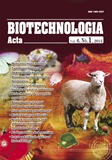ISSN 2410-7751 (Print)
ISSN 2410-776X (Online)

"Biotechnologia Acta" v. 6, no. 1, 2013
https://doi.org/ 10.15407/biotech6.01.113
Р. 113-118, Bibliography 25, Russian
Universal Decimal classification: 581.143.6
THE FREE PROLINE CONTENTS OF THE SUNFLOWER TISSUES THROUGHOUT THE MORPHOGENESIS in vitro
Sergeeva L. E., Komisarenko A. G., Bronnikova L. I., Mikhalska S. I., Tishchenko O. M.
Institute of Plant Physiology and Genetics of National Academy of Sciences of Ukraine, Kyiv
Low frequency of in vitro plant regeneration limits significantly wide expansion of biotechnology methods. The screening of explants with stable and high level of the morphogenesis is an open problem. It is known, that free proline fluctuations correlate with processes of plant growth and development in vivo and in vitro. Sunflower mature seeds were germinated in vitro. The contents of free proline at somatic tissues with different regenerational abilities were measured. Following explants were estimated: cotyledons from 1- or 4-days cultivating shoots; primary explants prepared for the regeneration procedure (segments of 4-day cultivating shoots); primary explants with and without initial morphogenesis, 6 days on the regeneration medium; shoots and certain explants at the moment of their mutual separation; explants, 10 days after shoots release. The top levels of free proline were observed in tissues with fulfiled organogenesis. The hypothesis about proline involvement to the process of sunflower morphogenesis in vitro is discussed. During primary screenings of explants the level of free proline can be appropriate index of in vitro sunflower organogenesis.
Key words: H. annuus L., in vitro culture, regeneration, organogenesis, proline.
© Palladin Institute of Biochemistry of National Academy of Sciences of Ukraine, 2008
References
1.Sergieieva L. Ye. Changes in cell culture under stress. Kyiv: Logos, 2001, 100 p. (In Russian).
2.Tyshchenko Ye. N., Mikhalskaia S. I. Agrobacterium-mediated transformation of sunflower. Fiziol. biochim. kult. rasteniy. 2006. 38(3), 187?196. (In Russian).
3.Neskorodov Ya. V., Mishutkina Ya. V., Gaponenko A. K., Skriabin K.G. Regeneration method in vitro of sunflower shoots (Helian thus annuus L.) of aseptic seeds as explants for genetic transformation. Biotekhnolohiia. 2007, No 6, P. 27?33. (In Russian).
4.Fiore M. C., Trobace T., Sunsery F. High frequency of plant regeneration in sunflower from
cotyledons via somatic embryogenesis. Plant Cell Rep. 1997, V. 16, P. 295?298.
http://dx.doi.org/10.1007/BF01088284
5. The patent for utility model No 40142 of 25. 03. 2009. Method of capacity increasing in vitro of morphogenetic sunflower genotypes with low regeneration ability. Mikhalskaia S. I., Sergieieva L. Ye. Л. Є., Komisarenko A. G., Malina A. E А. Е., Tyshchenko Ye. N.
6. Komisarenko A. G., Mikhalskaia S. I. , Malina A. E., Tyshchenko Ye. M. Effect of sodium thiosulfate and ultrasound on induction of in vitro regeneration of sunflower inbred lines (Helianthus annuus L). Visn.Ukr. t-va henetykiv i selektsioneriv. 2009, 7(1), 31?37. (In Russian).
7.Samaj I., Auxtova O., Boba K. M. Different regeneration potential of various sunflower (Helianthus annuus L.) genotypes in meristem culture. Biol. Plant. 1994, V. 36, P. 309?311.
http://dx.doi.org/10.1007/BF02921106
8.Maliga P. Isolation and characterization of mutants in plant cell culture. Ann. Rev. Plant
Physiol. 1984, V. 35, P. 519?542.
9.Bronner R., Jeannin G., Hahne G. Early cellular events during organogenesis and somatic embryogenesis induced on immature zygotic embryos of sunflower (Helianthus annuus L.). Can. J. Botany. 1994, 72(2), 239?248.
http://dx.doi.org/10.1139/b94-032
10. Lehmann S., Funck D., Szabados L., Rentsch D. Proline metabolism and transport development. Amino Acids. 2010, V. 4, P. 949?962.
http://dx.doi.org/10.1007/s00726-010-0525-3
11.Kavi Kishor P. B., Sangam S., Amrutha R. N. Regulation of proline biosynthesis,degradation, uptake and transport in higher plants: Its implication in plant growth and abiotic stress tolerance. Cur. Sci. 2005, 88(3), 424?438.
12.Szabados L. O., Savoure A. Proline: a multifunctional amino acid. Trends Plant Sci. 2009, 15(2), 89–97.
http://dx.doi.org/10.1016/j.tplants.2009.11.009
13.Wu L., Fan L., Guo L. Over-expression of an Arabidopsis ?-OAT gene enhances salt and
drought tolerance in transgenic rice. Chin. Sci. Bull. 2003, 48(23), 2594?2600.
http://dx.doi.org/10.1360/03wc0218
14.Rastagi S., Rizvi S. M. H., Singh R. P., Dwivedi A. N. In vitro regeneration of Zeucae na leucocephala by organogenesis and soma tic embryogenesis. Biol. Plant. 2008, 52(4), 743–748.
http://dx.doi.org/10.1007/s10535-008-0144-y
15.Murashige T., Skoog F.A revised medium for rapid growth and bioassays with tobacco tissue culture. Physiol. Plant. 1962, V. 15, P. 473?497.
http://dx.doi.org/10.1111/j.1399-3054.1962.tb08052.x
16.Andryushchenko V. K., Sayanova V. V., Zhuchenko A. A. Modification of proline determination method for identification Lycopersicon Tourn drought-resistant forms. Izv. AN MSSR. 1981, No 4, P. 55?60. (In Russian).
17. Sunflower. Ed. V. S. Pustovoit. M.: Kolos. 1975, 591 p. (In Russian).
18.Yamada M., Morishita H., Urano K. Effects of free proline accumulation in petunias under drought stress. J. Exp. Bot. 2005, 56(417), P. 1975?1981.
http://dx.doi.org/10.1093/jxb/eri195
19.Szekely G., Abraham E., Cseplo A. Duplicated P5CS genes of Arabidopsis play distinct roles in stress regulation and developmental control of proline biosynthesis. Plant J. 2008, V. 53, P. 11?28.
http://dx.doi.org/10.1111/j.1365-313X.2007.03318.x
20.Shylenkov A. V., Mazei N. G., Nefedieva E. E., Khrianin V. K. Содержание свободного пролина в прорастающих семенах гречихи и их качество при действии импульсного давления и пониженных температур. Selskkhoz. biologiya. Ser. Biol. rast. 2008, No 5, P. 70?77. (In Russian).
21. Sergieieva L. Ye., Bronnikova L. I., Tyshchenko Ye. N. Содержание свободного пролина как показа тель жизнедеятельности клеточной культуры Nicotiana tabacum L. при стрессе. Biotekhnolohiia. 2011, 4(4), 87-94. . (In Russian).
22.Cun S. K., Lei E. B., Tian K. R. The metabolism of proline and cross-resistance to salinity and heat stress in germinating seeds of wheat. Fiziol. Rast. 2005, 52(6), 897?904. (In Russian).
23.Maggio A., Miyazaki I. S., Veronese P. Does proline accumulation play an active role
in stress-induced growth reduction. Plant J. 2002, 31(6), 699?712.
http://dx.doi.org/10.1046/j.1365-313X.2002.01389.x
24.Zaitzev D. Y., Vysotskaya L. B. Immuno localization of endogenic phytohormones in androclinic calli of spring wheat. Biology of plant cells in vitro and biotechnology. IX
Intern. Conf., Zvenigorod, 8?12 sept.2008, P. 127.
25.Strizhov N., Abraham E., Okresz L. Differential expression of two P5CS genes controlling proline accumulation during salt-stress requires ABA and is regulated by ABAI, ABII and AXR2 in Arabidopsis. Plant J. 1997, V. 12, P. 557?569.
http://dx.doi.org/10.1046/j.1365-313X.1997.00557.x

